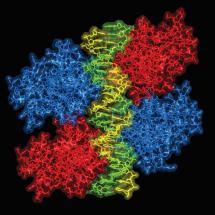
|
Bioinformatics
Doctoral Programme,
Faculty of Chemical Technology
The aim of the DSP programme is to educate specialists in bioinformatics, which is a combination of molecular and cell biology, biochemistry, statistics and computer science. Bioinformatics deals with the development of tools for the management of biological databases, algorithms for the processing of molecular-biological data and methods for the analysis and interpretation of relationships in these data. Most of the projects are biologically oriented with the aim to understand the complex context in the studied biological phenomena. However, we also run IT-oriented topics that include the development of algorithms or data processing methods. CareersThe combination of the education in natural sciences and informatics qualifies graduates to work in interdisciplinary teams. Graduates will find employment in a wide range of areas where data obtained by instrumental analysis of biological samples are processed. Graduates can also rely on a broad knowledge of informatics and can be successful in the development of software technologies, especially for data analytics. Graduates will further find employment in scientific infrastructures built in the Czech Republic within the framework of European operational programs. Due to the persisting lack of experts with an interdisciplinary education, graduates will also be easily employable outside the Czech Republic. Typical positions that DSP Bioinformatics graduate can hold: - researcher in basic or applied research in the public or private sector in the fields of biomedicine, clinical medicine, medical and pharmaceutical chemistry, food, agriculture, biotechnology or forensic science. Typical positions are postdoc, programmer, research associate, research fellow, project leader, project manager. - university lecturer in bioinformatics, computational biology, computational chemistry or applied informatics. Typical positions are assistant professor, assistant, lecturer. - software developer or data analyst in IT companies. - professional positions that require organizational and analytical skills and expertise not only in bioinformatics. Typical job positions include state administration at the highest management levels, organizations that are methodologically and organizationally engaged in science and research or non-profit and educational organizations. Programme Details
Ph.D. topics for study year 2026/27Bioinformatic analysis of deoxyribozymes
AnnotationDeoxyribozymes are DNA molecules that catalyze reactions. They are useful tools due to their low cost, high stability, and ability to function over a wide range of conditions. The goal of this thesis will be to develop new methods to analyze large deoxyribozyme datasets generated in our lab using selection and high-throughput sequencing. The project will require knowledge of standard bioinformatic approaches as well as emerging methods such as machine learning. Nuisance Compounds in High-Throughput Screening
AnnotationHigh-Throughput Screening (HTS) is a key technology in the early stages of drug discovery. Interpreting results can be complicated by the presence of nuisance compounds behavior (PAINS, aggregators, autofluorescence, cytotoxicity, and others) that obscure the distinction between true and false positives. Metadata-rich datasets from the CZ-OPENSCREEN and EU-OPENSCREEN infrastructures, as well as large public repositories, such as PubChem, provide opportunity to better understand existing patterns, as well as identify new ones. This context-aware methodology aims to investigate how compound structures, experimental setup, and chosen biological targets relate to observed nuisance behavior. The work involves compiling, annotating, and developing tools for detecting and interpreting nuisance compounds, including substructure filters, curated compound lists, machine-learning models, and their composite approaches. Particular focus is given to distinguishing different nuisance mechanisms, highlighting the likelihood and severity of various flags, and their combinations, and compiling these insights into interpretable, human-readable formats. This work also involves exploring the use of large language models to generate clear, context-sensitive labels and descriptions. These tools can be packaged into open-access resources for compound triage and integrated into the CZ-/EU-OPENSCREEN ecosystem, with the CZ-OPENSCREEN facility offering their experimental validation. Deciphering Lipid Metabolism in Cancer: Integrative Approaches in Metabolomics, Fluxomics, and Metabolic Engineering
AnnotationThis PhD project investigates the rewiring of lipid metabolic pathways in cancer using an integrative approach combining metabolomics, fluxomics, metabolic engineering, and in silico modeling. The research aims to deconvolute complex lipid metabolic pathways through metabolic flux analysis and stable isotope tracer studies, supported by Python-based data processing pipelines and advanced computational modeling. The study incorporates experimental work, including cancer cell culture systems and in vivo mouse models, to validate findings and quantify metabolic fluxes under physiological and pathological conditions. In silico simulations of lipid metabolism will be used to predict pathway behavior and identify potential intervention points. Machine learning approaches will aid in biomarker discovery and the prediction of metabolic vulnerabilities, offering insights into the mechanisms driving cancer progression and potential therapeutic targets. This interdisciplinary project bridges computational biology, biochemistry, and experimental cancer research, contributing to our understanding of lipid metabolism and the development of precision strategies for metabolic engineering and cancer therapy. The work will be conducted at the IPHYS CAS. The work is financially secured in terms of material and full time position. |
You are here: UCT Prague → Web PhD → Prospective doctoral candidates → Study Programmes and PhD Topics → Programme detail
Updated: 20.1.2022 16:26, Author: Jan Kříž

